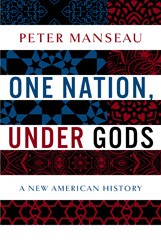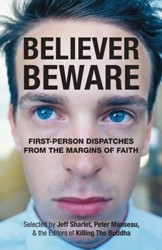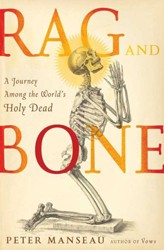In this historical novel, a young American stumbles across and sets out to translate the unpublished Yiddish memoirs of Itsik Malpesh. Malpesh’s love interests and adventures are basis enough for a saga. The Russian immigrant lived through major events in Jewish history and tells of his experiences in colorful, humorous language. Manseau’s sweeping novel spans generations and continents, languages and religions. Yet, the book is a great deal more than an immigrant’s epic tale. The novel intersperses Malpesh’s stories with personal notes from Malpesh’s translator. Eventually the life stories of the young American Catholic translator and the old Russian Jewish poet intersect in interesting and surprising ways. Songs for the Butcher’s Daughter is a book about writing, a warm, funny, and fascinating testament to the power of words, a power that outlives a dying language and transcends love.

Songs for the Butcher’s Daughter
Discussion Questions
Courtesy of Simon & Schuster
1. “Now that I have read them all, I know the many ways in which the tale of Malpesh’s life resonates with the events that led me to his door: a failed love affair, lies of faith, threat of scandal, and, most important, the promise of deliverance through the translation of words. (p. 7)” To what extent does the translator’s involvement with Malpesh seem grounded in his own preoccupations and emotional needs, rather than in an exact rendering of those of his subject? When he writes of “deliverance through…translation,” what kind of redemption is he looking for, and how does he achieve it in Songs for the Butcher’s Daughter?
2. How would you characterize Sasha Bimko’s role in the birth of Itsik Malpesh? How does Malpesh’s account of his birth compare to the reality that Sasha discloses to him as an adult? What does his own romanticized vision of his entry into the world reveal about Malpesh’s personality? Why does the translator decide to include both accounts of Malpesh’s birth in his translated memoir, despite their contradictions?
3. “In such an environment, not passing would have required a concerted effort. And, worse, it might have been disruptive. Why bother insisting I was not a Jew when such insistence would only confound everyone around me? (p. 41)” How does the translator’s decision to conceal his true religious identity as a Catholic affect his interactions with his coworker, Clara, and with Itsik Malpesh, the subject of his translation? What does his decision to feign being Jewish reveal about his own comfort with his actual identity?
4. “[M]y secret learning came at a cost. How could I forget the daily labor I endured to remain housed within this new castle of the mind? (p. 63)” How does Itsik’s deception of his family in order to learn how to read Russian compare to his translator’s deception of his employers to learn Yiddish? How does each man’s discovery of a new language open up new worlds to him, and what do these worlds represent in terms of future possibilities, hopes, and dreams?
5. How is Chaim Glatt responsible for changing the course of Itsik Malpesh’s life as a young boy in Kishinev, and how does that compare to his impact on Itsik, the young and naive émigré in New York, in his newly adopted persona of Charlie Smooth? What accounts for their seemingly irreparable connection to each other? To what extent is Itsik’s implication of Chaim in the death of Hershl Shveig a kind of payback for Chaim’s mistreatment of him over the years?
6. “Owing to my own relative ignorance when I first encountered his work, I did not mention any of the larger issues of accuracy…merely some incidents that, to my mind, strained a reader’s confidence in his reliability. (p. 85)” How does the series of translator’s notes that appears in the narrative of the Songs for the Butcher’s Daughter affect your reading of the life story of Itsik Malpesh? How did the translator’s role in the narrative inform your appreciation of Malpesh? To what extent can you imagine this novel stripped of the translator and his story?
7. “Is my bashert then Sasha Bimko? (p. 52)” I asked. How does his idealized vision of Sasha Bimko as his destiny, his beloved, and his muse enable Itsik Malpesh to focus his budding ambitions as a poet? In what respects does Malpesh’s attachment to Bimko seem to be grounded in a kind of self-preservation, as she is his one living connection to his birthplace and his family? To what extent does their eventual romantic involvement seem inevitable, and why does the resolution of that relationship in Songs for the Butcher’s Daughter, draw in Malpesh’s translator and his girlfriend, Clara?
8. How do the unfortunate circumstances surrounding Malpesh and Hershl Shveig’s first encounter compare to their later involvement as adults? Why does Malpesh misinterpret Shveig’s interactions with Sasha? What role do their religious differences of opinion play in Malpesh’s inability to comprehend Shveig’s innocence? How would you characterize the consequences of Malpesh’s actions against Shveig? Why does the translator choose to relate this information in his translation of the memoir, rather than expose Malpesh to the authorities as a murderer?
9. “There is more to tell about how I came to be the translator of Itsik Malpesh, and about the great joke of the fates this arrangement would come to seem.(p. 6)” How do the translator and Malpesh seem fated for each other? How does the translator’s connection to Sasha Bimko, through his relationship with Clara, lead Malpesh back to his bashert? How does “the great joke of the fates” (p. 6) seem to be at play throughout Songs for the Butcher’s Daughter, given the many quirks of coincidence that bring characters back into one another’s lives?
10. Of the many characters who populate Songs for the Butcher’s Daughter, which did you find most compelling, and why? Given the novel’s simultaneous narratives — the story of Itsik Malpesh, and the story of his translator — did you feel that either story was more engrossing, or did both engage you equally as a reader? To what extent are these dual narratives able to be separated from each other, and what argument might the author be making about the nature of translation in their interconnectedness?

Help support the Jewish Book Council.



